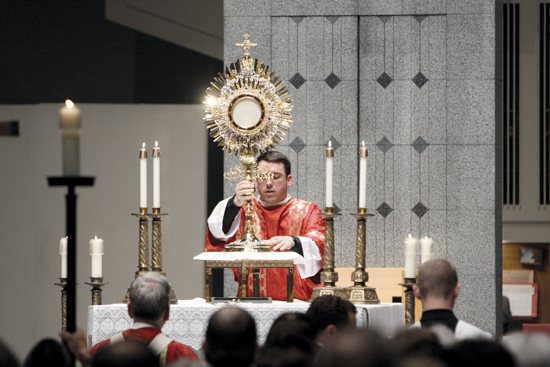This guide provides a number of useful resources.
Note: Many of the electronic resources listed here are limited to use by members of The University of St. Thomas community (faculty, staff and students). If you are using the Guide off-campus, it will ask for a brief login to identify yourself as a member of The University of St. Thomas community before you can use these resources.
Liturgy: An established formula for public worship, or the entire ritual for public worship in a church which uses prescribed forms; a formulary for public prayer or devotion. In the Roman Catholic Church it includes all forms and services in any language, in any part of the world, for the celebration of Mass.
Source: Webster's Revised Unabridged Dictionary (1913)
-----------------------------------------------------------------
Some newer materials at Ireland Library:
 Benedict XVI and the Sacred Liturgy
Benedict XVI and the Sacred Liturgy
 USCCB web page about the new Roman Missal
USCCB web page about the new Roman Missal
 Sacrosanctum Concilium and the Reform of the Liturgy
Sacrosanctum Concilium and the Reform of the Liturgy
 Musica sacra : music at Mass, a liturgical and pastoral challenge
Musica sacra : music at Mass, a liturgical and pastoral challenge
 Catholic Church Architecture and the Spirit of the Liturgy
Catholic Church Architecture and the Spirit of the Liturgy
 The old mass and the new : explaining the motu proprio Summorum Pontificum of Pope Benedict XVI / Marc Aillet
The old mass and the new : explaining the motu proprio Summorum Pontificum of Pope Benedict XVI / Marc Aillet
 Eucharist / Robert Barron
Eucharist / Robert Barron
 The Lamb's Supper / Scott Hahn
The Lamb's Supper / Scott Hahn
"Liturgical Movement, a 19th- and 20th-century effort in Christian churches to restore the active and intelligent participation of the people in the liturgy, or official rites, of the Christian religion. The movement sought to make the liturgy both more attuned to early Christian traditions and more relevant to modern Christian life. The process involved simplifying rites, developing new texts (in the case of Roman Catholicism, translating the Latin texts into the vernacular of individual countries), and reeducating both laity and clergy on their role in liturgical celebrations. The Liturgical Movement made use of patristic and biblical studies, Christian archaeology, and the increased availability of early Christian literature and liturgical texts... Revisions of liturgy attempted to bring the rites more in accord with early Christian liturgical understanding and practices and yet to take into account the present needs of church members. Early changes included an emphasis on frequent reception of communion at mass and some revisions in the church calendar.
Pope Pius XII played a significant role with the 1947 encyclical Mediator Dei, in which he stressed the importance of liturgy and the need for people to participate. The actual reform of rites began with Holy Week revision in 1951 and 1955 The second Vatican Council (1962–65) endorsed the aims of the movement and recommended that Roman Catholics should actively take part in the liturgy; legislated the use of the vernacular for liturgies, overturning the traditional Latin as the sole liturgicalal Latin language; and ordered the reform of all sacramental rites, a task completed in the 1970s. A new lectionary and calendar (the Ordo Missae) appeared in 1969, and a definitive Roman Missal was published in 1970."
From Britannical Online
 A challenging reform : realizing the vision of the liturgical renewal, 1963-1975 / Piero Marini
A challenging reform : realizing the vision of the liturgical renewal, 1963-1975 / Piero Marini
 The reform of the liturgy, 1948-1975 / by Annibale Bugnini
The reform of the liturgy, 1948-1975 / by Annibale Bugnini

The Church uses the Latin phrase, lex orandi lex credendi (“the law of praying is the law of believing”) to express the deep connection between liturgy and doctrine.